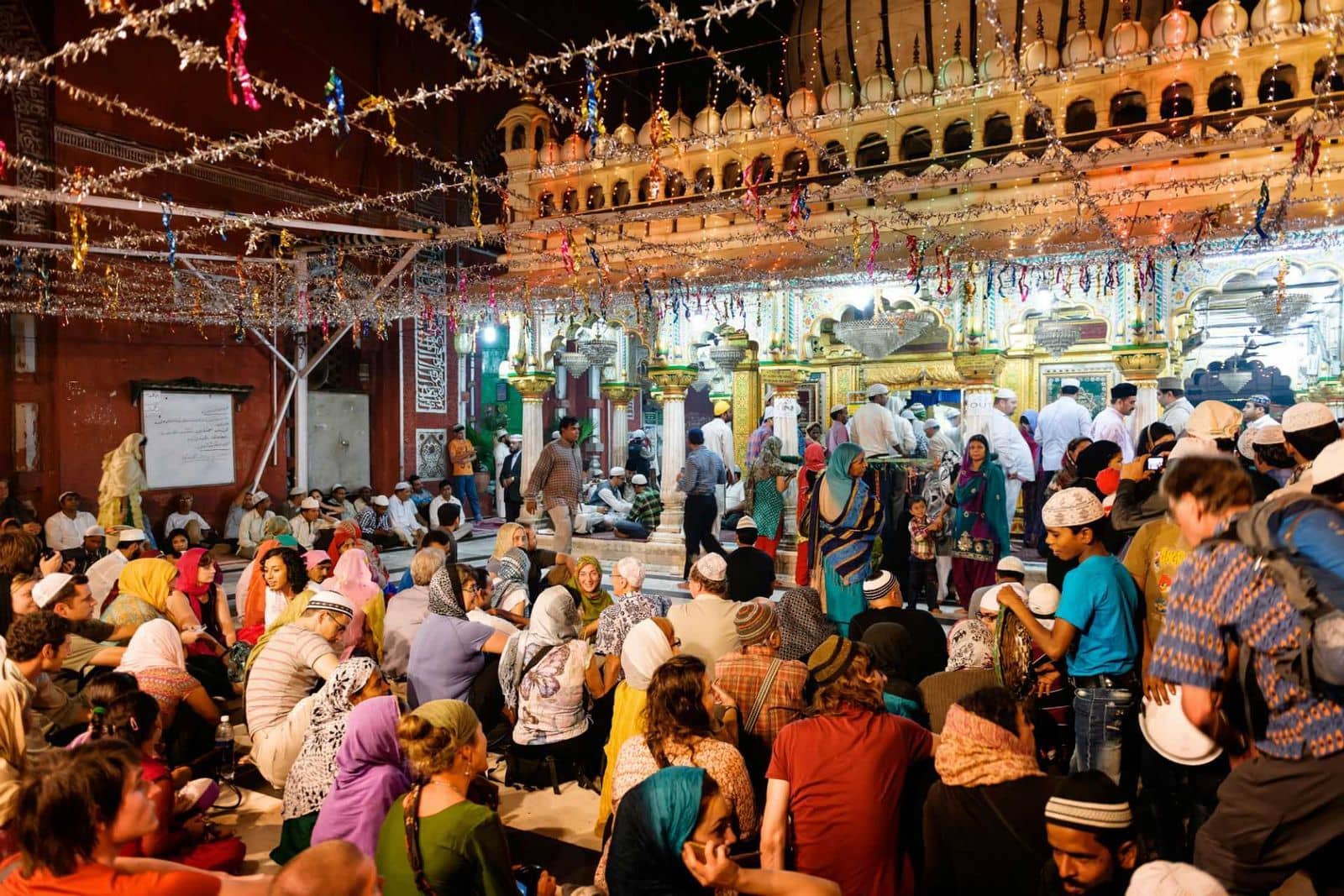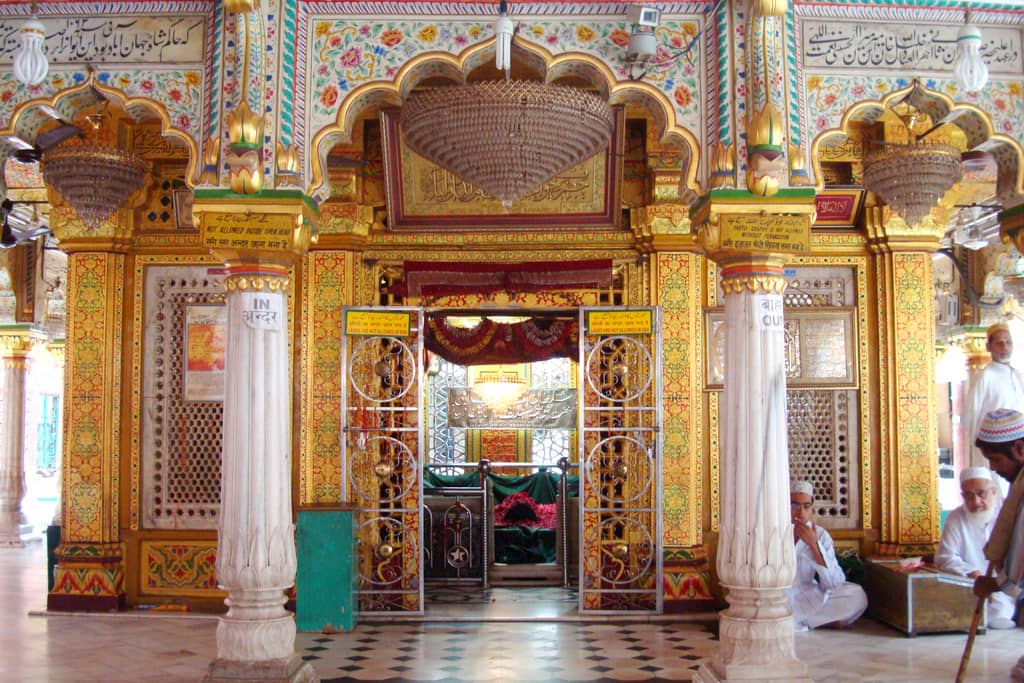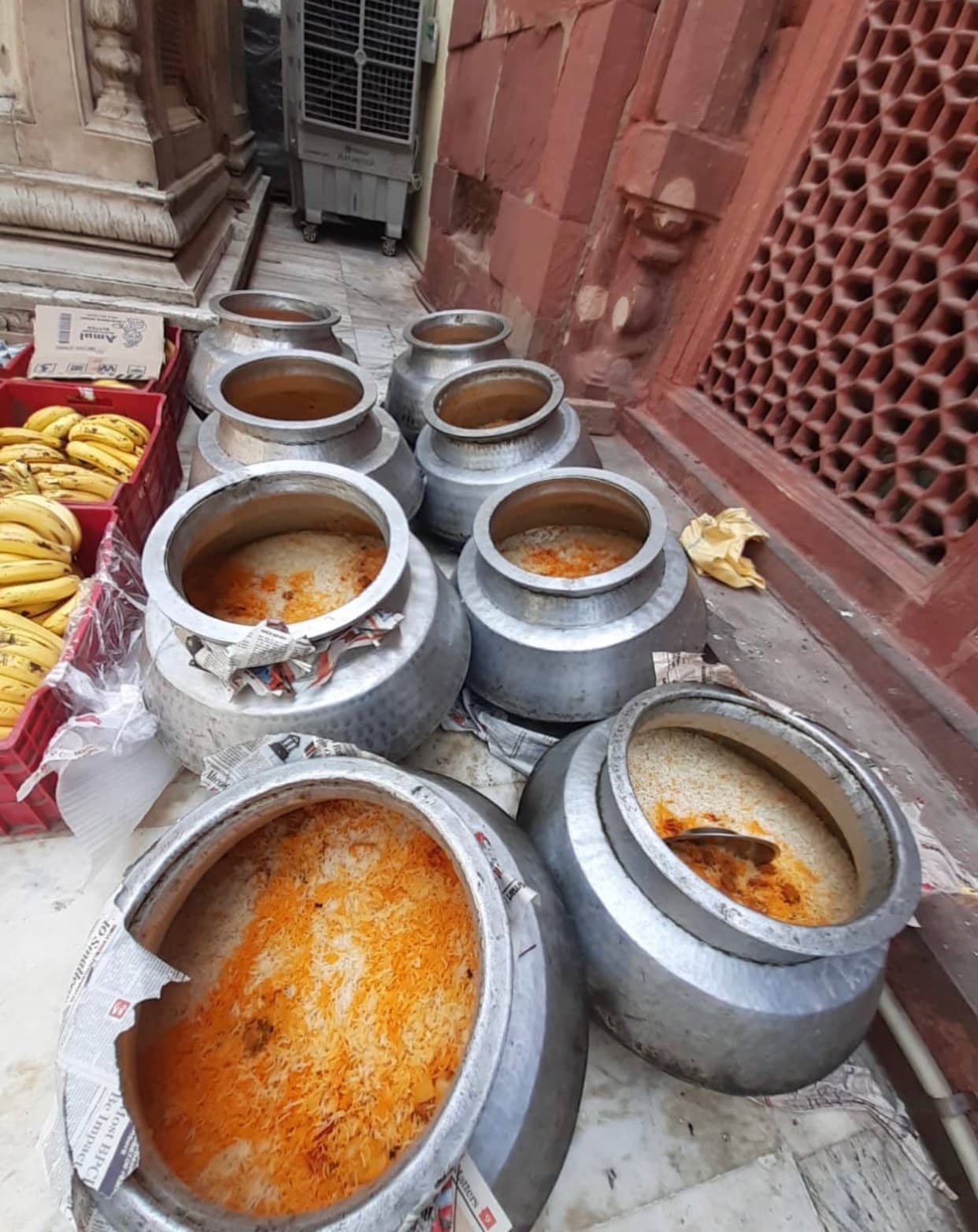
Nizamuddin Dargah
A revered Sufi shrine in Delhi, known for its spiritual ambiance, soul-stirring Qawwali, and welcoming spirit for all faiths.

Highlights
Must-see attractions

Social
From TikTok & Reddit
Best Time
Experience the vibrant Qawwali

Nizamuddin Dargah
Best Time
Experience the vibrant Qawwali

Highlights
Must-see attractions
A revered Sufi shrine in Delhi, known for its spiritual ambiance, soul-stirring Qawwali, and welcoming spirit for all faiths.
"Experience profound peace and vibrant devotion at this iconic Sufi shrine."

👟 Shoe Storage
Carry a bag for your shoes or use the stalls outside; often a small offering is appreciated.
🌸 Flower Offerings
You can buy flowers for offerings, but it's optional. Skip if you prefer.

Highlights
Discover the most iconic attractions and experiences

Qawwali Performances
Main prayer hall
Experience the mesmerizing Sufi devotional music that fills the air with spiritual energy and rhythm.

Shrine of Hazrat Nizamuddin Auliya
Inner sanctum
Feel the profound peace and spiritual energy of this revered Sufi saint's final resting place.

Community Kitchen (Langar)
Designated area
Witness or partake in the tradition of free vegetarian meals served to all, embodying the spirit of selfless service.
Plans like a pro.
Thinks like you
Planning Your Visit
Timing is Key for Qawwali
Respectful Attire & Customs
Best Times
Insider Tips
from TikTok, Instagram & Reddit
Nizamuddin Dargah Visit
👟 Shoe Storage
Carry a bag for your shoes or use the stalls outside; often a small offering is appreciated.
🌸 Flower Offerings
You can buy flowers for offerings, but it's optional. Skip if you prefer.
Visiting Nizamuddin Dargah as a solo foreigner
We need to talk about the dargah scams !!
🙏 Modest Dress Code
Cover shoulders and knees. Headscarves are recommended for women.
⏰ Qawwali Timing
Thursday evenings are best for Qawwali, usually between 6-8 PM.
Is this time safe for Nizamuddin Dargah
Tips
from all over the internet
👟 Shoe Storage
Carry a bag for your shoes or use the stalls outside; often a small offering is appreciated.
🌸 Flower Offerings
You can buy flowers for offerings, but it's optional. Skip if you prefer.
🙏 Modest Dress Code
Cover shoulders and knees. Headscarves are recommended for women.
⏰ Qawwali Timing
Thursday evenings are best for Qawwali, usually between 6-8 PM.
🧘♀️ Find Inner Peace
Sit and meditate; the shrine's energy is palpable and calming.
What Travellers Say
Reviews Summary
Visitors consistently praise Nizamuddin Dargah for its profound spiritual atmosphere, the captivating Qawwali performances, and its inclusive nature, welcoming people of all faiths. The delicious food options in the surrounding area are also a major draw. Some find the crowds overwhelming, especially during peak times, and suggest being mindful of touts offering unsolicited services.
"It was a very nice time that i spent here with my whole family.
You can carry your own bag to carry your shoe and slippers. Also you can keep them at any stall and buy some flowers in exchange.
You can sit there as long as you want.
If you want to feel relaxed you must visit this place.
People from every religion can visit this place."
Arvaj Salmani
"Shrine has powerful energy which one can experience by mere visiting & sitting there. Evening time is the most happening time in the shrine. You can witness many performances happening there."
Abhishek Singh
"Hazrat Nizamuddin Aulia (1238–1325) was one of the most revered Sufi saints in India, particularly known for his role in the Chishti Order of Sufism. Born in Badayun, Uttar Pradesh, he spent much of his life in Delhi, where his spiritual influence left a profound impact on both the local populace and the broader Islamic world.
Key Aspects of His Life and Teachings:
1. Sufi Teachings and the Chishti Order: Hazrat Nizamuddin Aulia was a prominent figure in the Chishti Sufi tradition, which emphasized love, devotion, humility, and service to humanity. He was known for his deep spirituality and commitment to helping others, especially the poor and needy. His teachings emphasized that true devotion to God is manifested through love and service to fellow beings.
2. Discipleship and Spiritual Influence: Hazrat Nizamuddin's mentor was the famous Sufi saint, Hazrat Fariduddin Ganjshakar, who also played a significant role in spreading the Chishti teachings. His disciples included some of the most notable Sufi saints, such as Amir Khusro, a famous poet, scholar, and musician.
3. Amir Khusro: Hazrat Nizamuddin's close associate, Amir Khusro, was instrumental in shaping the cultural landscape of India. Khusro's poetry and contributions to music were deeply influenced by his spiritual bond with Nizamuddin Aulia. Their relationship led to the creation of the distinctive Sufi poetry and music traditions, including Qawwali, a form of devotional music still popular today.
4. Sufism and the Common People: Nizamuddin Aulia was known for his compassion and accessible approach to spirituality. He welcomed people from all walks of life, including Hindus, Muslims, and others, into his circle. He taught that love for God transcends all religious boundaries.
5. Legacy: Hazrat Nizamuddin Aulia's shrine, located in Delhi, is one of the most important Sufi shrines in India. His annual Urs (death anniversary) is a major event, attracting thousands of devotees who come to offer prayers and participate in spiritual gatherings.
6. Miracles and Stories: Like many Sufi saints, Hazrat Nizamuddin was associated with numerous miracles. Stories of his healing powers, his acts of charity, and his deep connection with God are widespread. These stories continue to inspire his followers and are a testament to his spiritual stature.
Hazrat Nizamuddin Aulia's life and teachings continue to be a beacon of love, peace, and devotion, influencing millions even today. His message of tolerance, charity, and spirituality remains deeply embedded in the cultural and religious fabric of India."
Sâhîl Rîzvî
What People Like
What People Dislike
Frequently Asked Questions
🚇 🗺️ Getting There
Nizamuddin Dargah is easily accessible by metro, auto-rickshaw, or taxi. The nearest metro station is Nizamuddin, which is a short walk away. Many ride-sharing apps also service the area.
Yes, the dargah is situated in the bustling Nizamuddin Basti area of Delhi, known for its vibrant atmosphere and historical significance.
For convenience, consider using ride-sharing apps or pre-paid auto-rickshaws. The metro is also a cost-effective option if you don't mind a short walk.
Parking can be challenging due to the dense urban setting. It's advisable to use public transport or drop-off services rather than driving directly to the dargah.
Yes, the Dargah is a well-known landmark. Follow signs or ask locals for directions; it's a short walk from the main road into the market area.
🎫 🎫 Tickets & Entry
No, entry to Nizamuddin Dargah is free for all visitors, regardless of religion. It's a place of worship and community.
The Dargah is generally open from sunrise to sunset, but specific prayer times may vary. It's advisable to check local timings, especially for evening events.
No advance booking is required as there is no entry fee. You can visit anytime during its open hours.
Photography is generally permitted, but it's respectful to avoid taking pictures of people praying or during religious ceremonies. Be mindful of your surroundings.
You must remove your shoes before entering. You can either carry them in a bag or leave them at designated stalls outside, often in exchange for a small offering.
🎫 🧭 Onsite Experience
The most popular time for Qawwali is Thursday evenings, typically between 6 PM and 8 PM. Arrive early to get a good spot.
The atmosphere is deeply spiritual, serene, and communal. You'll experience a blend of devotion, music, and the warmth of shared faith.
Absolutely. Nizamuddin Dargah is known for its inclusive nature, welcoming visitors from all faiths.
Experience the Qawwali, offer prayers at the shrine, soak in the peaceful ambiance, and perhaps witness the community kitchen.
Yes, it is generally safe, but like any crowded place, be aware of your belongings. The atmosphere is welcoming and respectful.
🍽️ 🍽️ Food & Dining
Yes, the area around the Dargah is famous for its delicious Mughlai cuisine. You can find numerous eateries serving kebabs, biryanis, and other local specialties.
Expect authentic Mughlai dishes, including various kebabs, rich curries, fragrant biryanis, and popular desserts like falooda and kulfi.
The Dargah is known for its tradition of serving free vegetarian meals (langar) to devotees and visitors, embodying the spirit of charity.
Don't miss out on kebabs, especially the seekh and tikka varieties, along with a flavorful biryani. Falooda is a popular dessert choice.
Generally, the food prices in the eateries surrounding the Dargah are quite reasonable, offering good value for authentic flavors.
📸 📸 Photography
Photography is generally allowed, but it's important to be respectful. Avoid photographing people during prayer or ceremonies.
The intricate architecture, the vibrant crowds during Qawwali, and the serene interiors offer great photographic opportunities. Capture the spiritual essence.
It's best to avoid using flash, especially inside the prayer halls or when photographing individuals, to maintain a respectful environment.
You can capture the devotional atmosphere, the architecture, the Qawwali performances, and the communal spirit of the place.
Always ask for permission before photographing individuals. Be discreet and prioritize the sanctity of the place over your shots.
For Different Travelers
Tailored advice for your travel style
👨👩👧 Families with Kids
Key tips for families: Ensure children are dressed modestly, keep them close in crowded areas, and explain the significance of the place beforehand. The community kitchen (langar) can be a good way to introduce children to the concept of sharing and service. Be mindful that it can get crowded, especially on Thursdays.
🙏 Spiritual Seekers
Recommendations: Dedicate ample time to sit and absorb the atmosphere. Engage with the Qawwali performances, and consider participating in the communal prayers. The Dargah is a space to quiet the mind and connect with a higher sense of purpose.
🍜 Food Enthusiasts
Must-trys: Don't leave without sampling the diverse range of kebabs, the flavorful Nihari, and the sweet, refreshing falooda. Exploring these food stalls and small restaurants is an integral part of the Nizamuddin Dargah experience, offering delicious and affordable meals.
Deep Dives
In-depth insights and expert knowledge
The Spiritual Significance of Nizamuddin Dargah
The spiritual energy of the Dargah is palpable, with many visitors reporting a profound sense of peace and tranquility upon entering. This is amplified by the constant recitation of prayers, the scent of incense, and the communal atmosphere. The shrine is not just a place of worship but a living testament to the enduring legacy of Sufi ideals of tolerance and compassion.
Key Aspects of Sufi Practice Here:
* Qawwali: The most famous aspect is the devotional music performance, Qawwali, which is believed to induce a state of spiritual ecstasy. It's a powerful expression of Sufi love for the divine.
* Community Service: The tradition of serving free meals (langar) to all visitors embodies the Sufi principle of selfless service and hospitality.
* Interfaith Harmony: The Dargah is a symbol of religious harmony, welcoming people from diverse backgrounds to share in its spiritual ambiance.
Experiencing Qawwali at Nizamuddin Dargah
Qawwali sessions are most commonly held on Thursday evenings, though timings can be flexible and sometimes occur on other days as well. It's advisable to arrive between 6 PM and 8 PM to secure a good vantage point, as the main prayer hall can get quite crowded. The energy of the performers and the collective participation of the audience create an unforgettable atmosphere.
Tips for Enjoying Qawwali:
* Arrive Early: To get a comfortable spot, especially on Thursdays.
* Be Respectful: Maintain silence during performances and avoid disruptive behavior.
* Immerse Yourself: Let the music and the collective devotion wash over you for the full experience.
Culinary Delights Around the Dargah
Some of the must-try dishes include the melt-in-your-mouth seekh kebabs, flavorful chicken tikka, and the iconic Nihari. For those with a sweet tooth, the creamy falooda and rich kulfi are perfect ways to end a meal. The vibrant market streets are lined with food stalls and small restaurants, each offering a unique taste of Delhi's culinary heritage.
Popular Food Choices:
* Kebabs: Seekh, Tikka, Boti.
* Biryani: Fragrant and flavorful rice dishes.
* Desserts: Falooda, Kulfi.
* Local Specialties: Nihari, Haleem.
Social
from TikTok, Instagram & Reddit